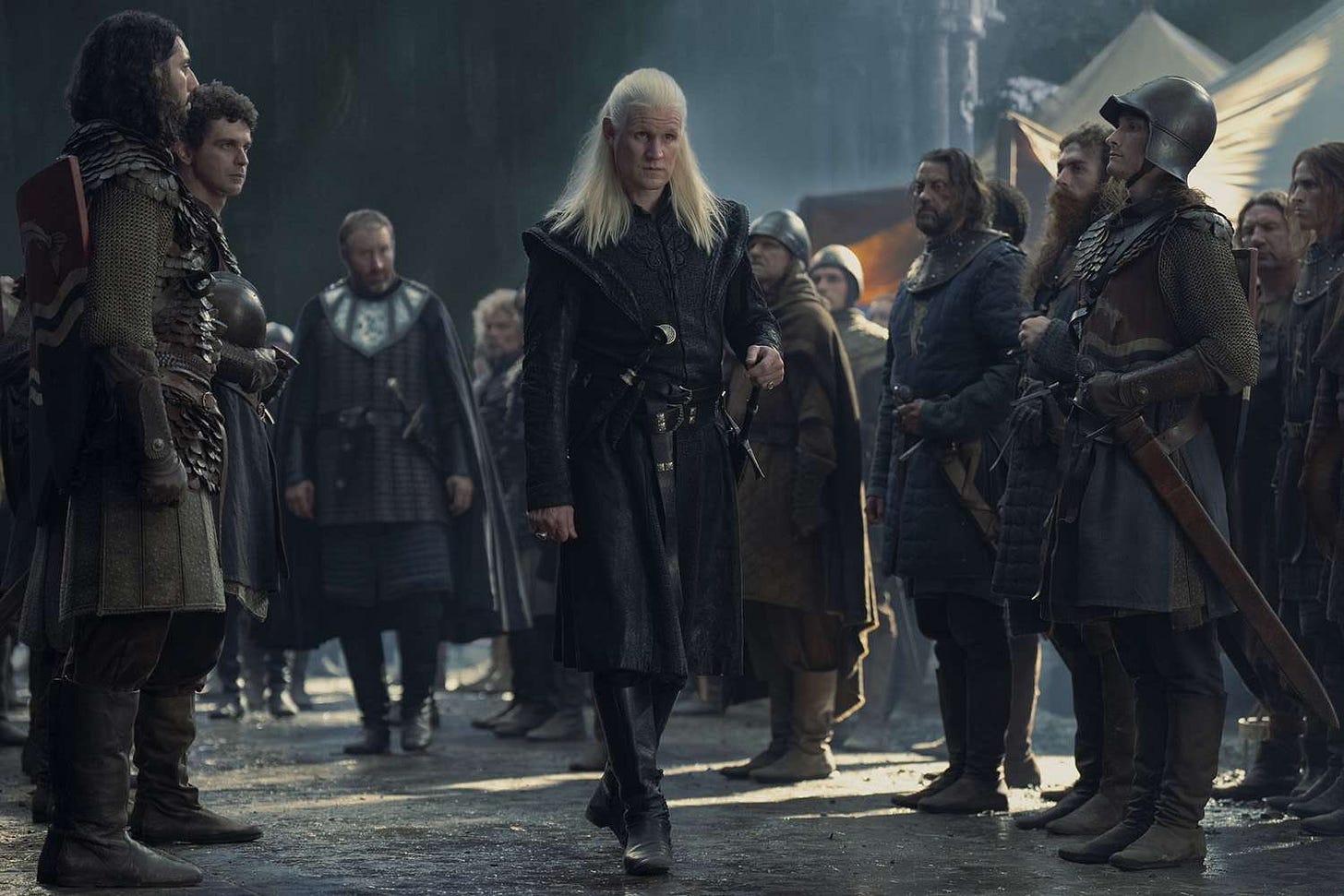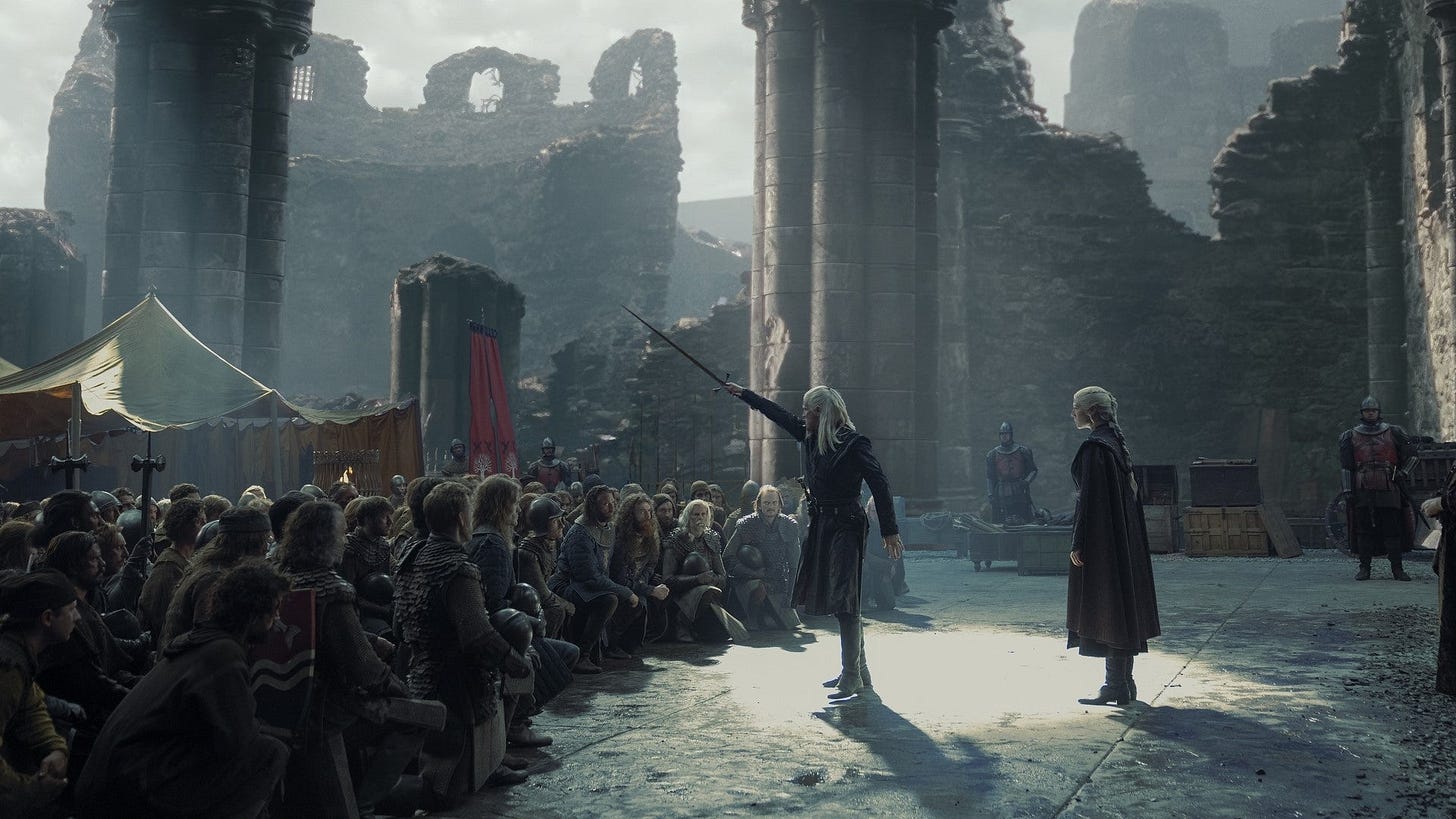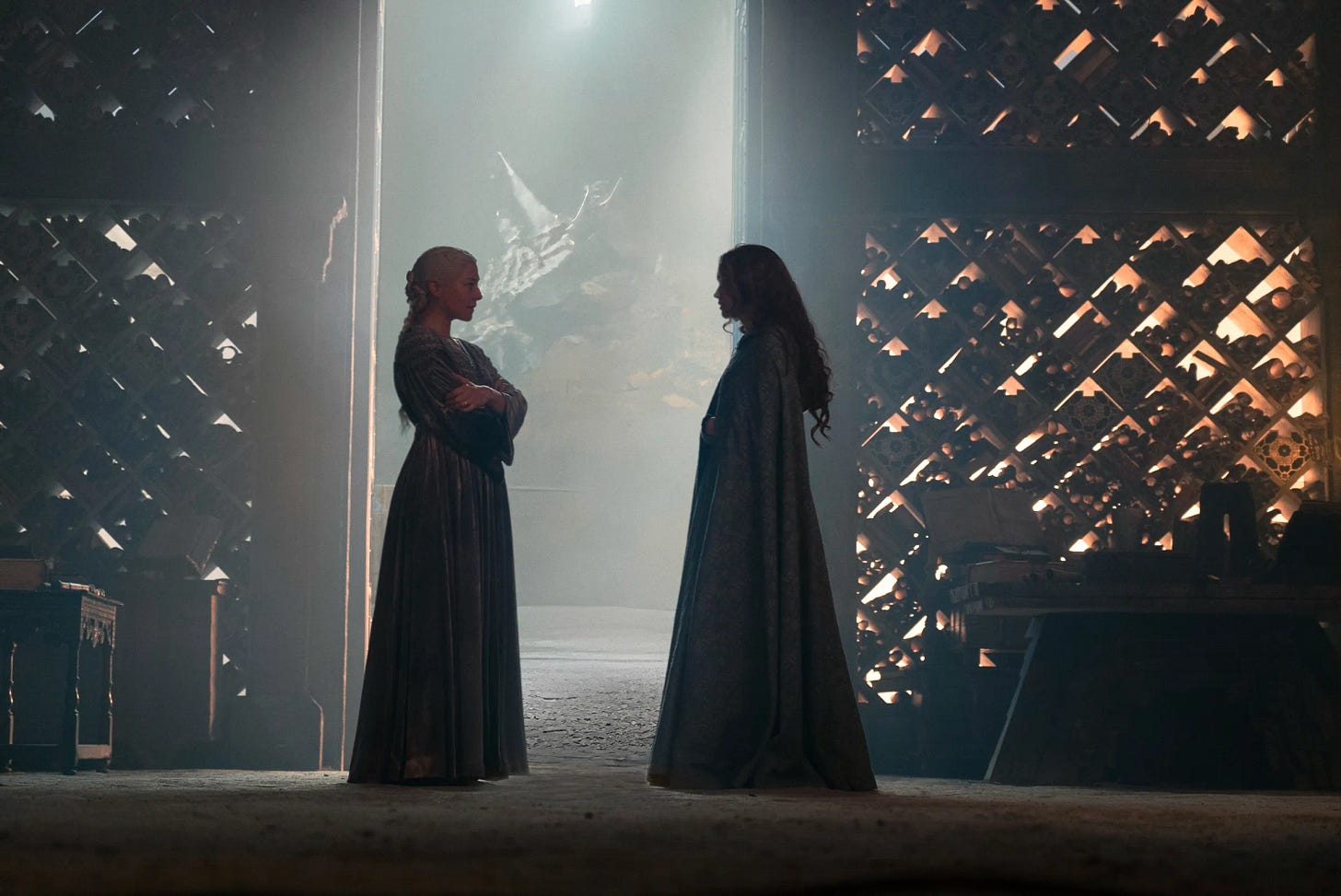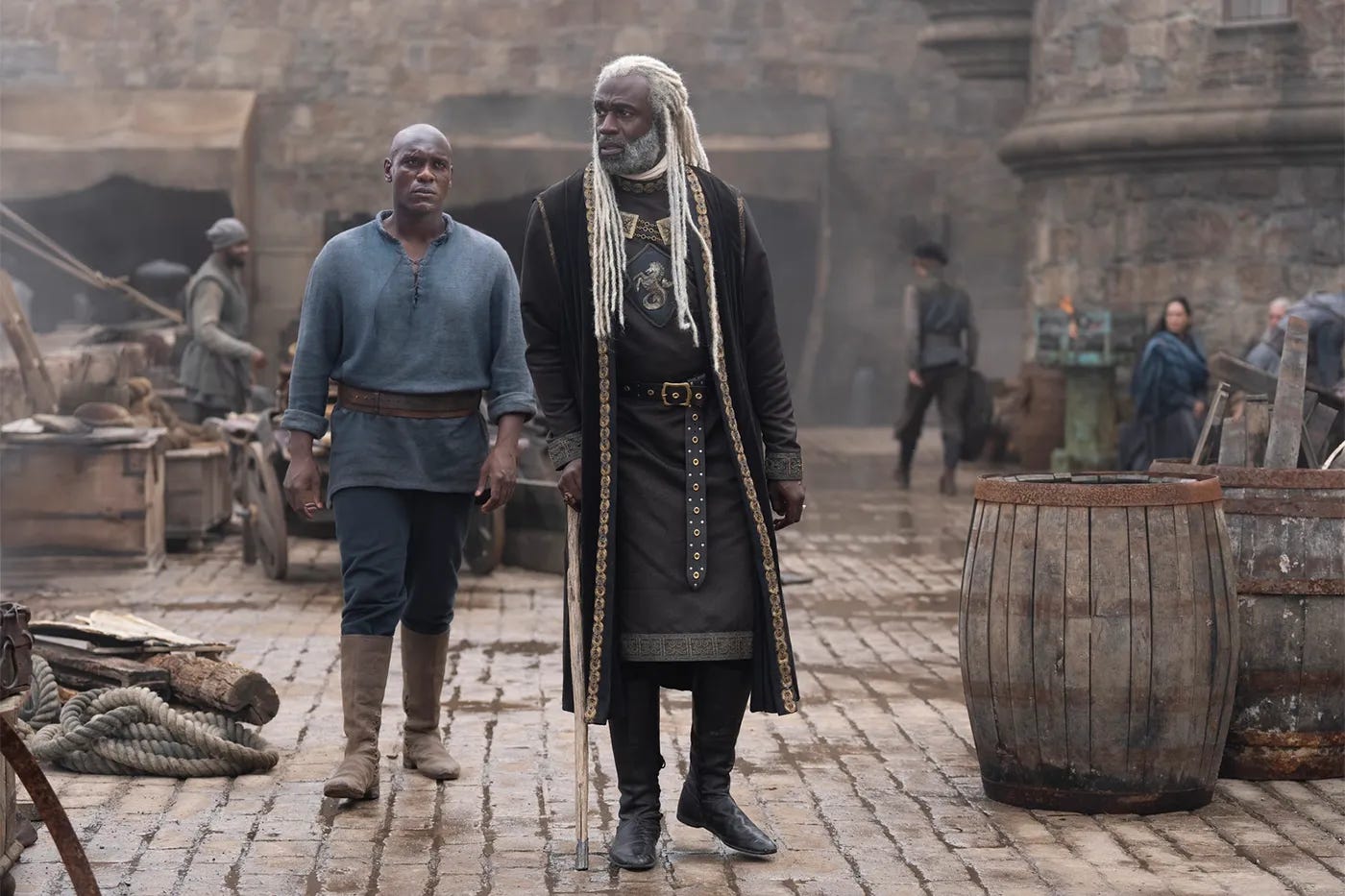House of the Dragon Season Two Review: An Underwhelming, Jumbled Mess
Lacking an overarching theme, Season Two remains adrift and directionless, wasting time on characters who offer very little and ignoring character who offer so much.
House of the Dragon’s Season 2 concluded this Monday and it’s safe to say it has been disappointingly underwhelming. Far from being the visual feast for the eyes the marketing portrayed it as, the season landed with a dull thud, ending as it began, with armies marching and characters looking helplessly into the distance. Another episode laboured to move pieces into place, establishing unique character dynamics and delivering some beautifully written dialogue, but ultimately failing to deliver the hoped-for action alongside it.
To start with, before considering the show’s many flaws, it might be best to offer a few defences of the show to prove that the following criticisms are conducted in good faith and not borne from a visceral hatred of the writers or source material. The second season is, by no means, a bad show. Far from it. Every scene still permeates with the high-production quality expected of a prestigious HBO show. From elegant designer dresses to grandiose set pieces to immaculate CGI dragons battling on screen, every dollar spent on House of the Dragon has been used to its best effect.
As always, the acting is the biggest redeeming quality. Alicent Hightower, played fabulously by Olivia Cooke, remains a Renaissance portrait of melancholy, grappling with the events she has inadvertently set in motion, and Emma D’arcy, as Rhaenyra Targaryen, elevates every scene with their presence, conveying a myriad of emotions often with just a simple expression. Other adept actors allow sombre or bright moments to juxtapose with finesse.
Just scrolling online, I’ve already seen many (disingenuous) people attempt to conflate this season with the last two of Game of Thrones, but I believe that is hyperbolic. Despite its flaws – of which there are many – the story never veered into the absurd territory enjoyed by its predecessors’ dying moments. No, the best comparison to make would, perhaps, be between Seasons 5 and 6, where the plot still remained cohesive but was still plagued with enough asinine writing decisions and deviations from the book to raise objections. Like those seasons, this one had its highs (Rook’s Rest, Aegon’s character development) and many, many lows (Daemon’s acid trip in Harrenhall, the stagnant writing, shallow dialogue), dragging down the season’s overall quality.
We now know, thanks to recent insider leaks, that the lack of a satisfying conclusion in the finale can be blamed on budget constraints imposed by executives. According to Elio Garcia of Westeros.org, “the season was originally envisioned to be ten episodes long, but a month before filming, HBO forced them to cut two episodes” in cost-cutting measures following deeper financial problems with parent company Warner Bros. And then, since the writers’ strike started three months later, the lead writers, most of whom were American, were unable to work during filming to reorganise things, leaving them with a jumbled mess to sort through.
While blame should undoubtedly fall upon David Zaslav, CEO of Warner Bros Discovery, for how Season 2 turned out, there are still fundamental issues with how S2 was approached from a creative level. Structuring the season on three locations where two moved at a snail's pace. Overemphasis on characters who weren't that plot-relevant like Alicent, Rhaenyra, and to a lesser extent Daemon at the expense of characters who made more dynamic stories. Repetitive plotlines, stagnant characterizations, empty dialogue and a lot of illogical and contrived scenes – all of these are faults of the writing decisions. A 10-minute action scene would not absolve the season of these issues alone, let alone distract from them.
Blame may fall on the lack of action, but the season did not need gratuitous action scenes to salvage it. After all, everyone’s favourite moments from the preceding season were of a man slowly dragging himself across the throne room to defend his daughter’s birthright and a family squabbling over a dinner table. That alone proves that House of the Dragon’s greatest strengths stem from the character-driven drama rather than elaborate battle sequences. And a slower pace is conducive for emphasising such drama. However, the fundamental problem facing this season is not so much the slower pace, more so the slower pace isn’t used to its full advantage.
In a vacuum, most scenes are tolerable and can be appreciated for their direction and acting. But what ultimately harms the show is that it never feels like a connected tissue. The narrative is often fragmented. Characters do not behave logically or consistent with prior events.
Secondary characters are wasted. Corlys spends the entirety of the season bickering with his estranged son in the shipyard. Jace’s pivotal moments from the book – his diplomatic mission to the North and Vale, training the dragonseeds – are omitted completely, forcing him to stand in the background, ignored and forgotten. Aegon and Helaena barely interact, let alone speak of the other, their only verbal exchange a product of the actors petitioning their characters to have more scenes. In fact, Helaena shares more dialogue with Daemon, the architect of her son’s death, than her own brother-husband. To illustrate how badly mishandled the time allocation is with this season, just remember that Cheese’s dog has more screen presence than Dreamfyre, Joffrey, Jaehaerys and Sunfyre.
The genesis of the criticism stems from the show-runners’s decision to keep the narrative’s focus revolving around the Rhaenyra and Alicent relationship so pivotal to the first season. While that may have been relevant at the beginning of the story when their feud acted as the catalyst for the war breaking out, as armies are mustered and children are slain, the preservation of this childhood link is tonally jarring.
Instead of moving on from the dynamic when it had naturally run its course, the showrunners decided to cling steadfastly to a relationship that is inconsistent with the story being told. There is no reasonable explanation for why Alicent and Rhaenyra are still reminiscing about a childhood relationship that ended over 15 years ago, especially as their family members are caught in the crossfire.
The insistent need to keep the show’s conflict gravitating around them means time better spent on other characters is wasted on the leading actresses, a decision that would have been welcomed if they had been given more material to work with. Olivia Cooke, despite all of her best efforts, can do no more than look sullen and hopeless as other characters with agency do most of the work, leaving her to be nothing more than a background fixture, a decorative piece embellishing the scene and little else.
Because the show has built itself around these two characters, it has to keep finding excuses for them to get together, regardless of any minor distractions like, for example, reality. And logic. And storytelling. So, the writers force Alicent and Rhaenyra to meet in contrived, logistically impossible scenarios, undermining not only their established motives but also the grounded setting of this conflict.
Rather than craft a cohesive, well-written story set against the backdrop of an inter-family civil war, the writers decided to cater to a vocal online minority clamouring for an Ao3 lesbian fanfiction. Scenes are not written to serve a narrative purpose, but instead designed to elicit a response from people on Twitter and TikTok, who now steer the direction of the show. If the viewers want a sapphiric melodrama, they’re rewarded with it. If they want scenes for shock value, they’re rewarded with it.
The writers have been terrified of portraying the lead female characters with any major flaws, so they have re-imagined the dance as a simple male dominated lust for power. The innocent female rulers simply do their best to find peaceful solutions to this escalating conflict, whilst becoming victims in this patriarchal and misogynistic world. This bastardisation of the original narrative neuters the essence and impetus of the story, that women can be wrathful and vindictive and willing to burn entire kingdoms to not only protect their family, but also in service of their own lust for power and recognition just like any male. It's not a story Hollywood is willing to tell, so we have whatever this is.
Instead, throughout the show, the writers advance the theme of men being murderous, blood-thirsty monsters baying for war and destruction, juxtaposing it with the virtuousness and pacificism of the women, who strive for peace at all costs. Such a generalised and simplistic interpretation of the world inadvertently depicts all of the women in the story as naive, gullible fools, too weak to strike. It deprives them of their agency, making them nothing more than spectators in their own story.
Yes, while medieval societies did sideline women, female rulers could often be as ambitious and as vindictive as their male counterparts. And the world of Westeros is not foreign to strong, proud women. From Visenya committing war crimes in Dorne to Alyssane governing alongside her regal husband to Cersei ruling in all but name, GRRM’s works regularly invert those traditional power structures. The women in House of the Dragon are meek, fragile and naive, almost validating all of the sexist arguments used to justify their disenfranchisement. Rhaenyra paces around Dragonstone for most of the season, wallowing in her own self-pity, asking other characters for advice and then abruptly rejecting it. Alicent goes to Rhaenyra and offers her three sons on a silver platter.
According to the writers of this show, children apparently are worthless if they are born as evil males in service of the patriarchy, their inherent misogyny condemns them to their fate. Sacrificing all your male children in the name of girl boss friendship is an act of heroism.
This brings me to my next point: the deaths of Lucerys and Jaeherys do not haunt the narrative in the way they should. For a show that professes to be character-driven, time is rarely spent exploring these raw emotions. The characters grieve for them in the following episode before swiftly moving on. Rhaenyra hardly mentions Lucerys again and Alicent forgets the death of her grandson in her meeting on Dragonstone. In fact, the only person who actually grieves for Jaehaerys for an extended amount of time is Daemon, the one who orchestrated his death to begin with.
Characters have been squandered, subplots wasted. The textual skill on display is appreciated and would be appropriate for a mid-season installment. The imagery and action, however, fall well short of finale expectations. They say the pen is mightier than the sword and that’s all well and good. But let’s hope season 3 brings us some actual swordplay.
If nothing else, Season Two of House of the Dragons offers a stark warning of the perils that befall adaptations when writers and show-runners feel compelled to edit and tamper with stories either out of hubris or pedantism.





